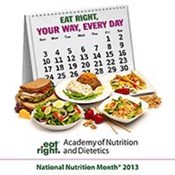Eating right is essential to keeping your body running at its best. During National Nutrition Month®, the Academy of Nutrition and Dietetics reminds you to build an eating plan with your unique lifestyle and nutritional needs in mind. So whether you're a vegetarian, student, athlete, busy parent or a jet-setting executive, it’s important to "Eat Right, Your Way, Every Day."
"There's no one-size-fits-all way to eat that's right for everyone," says registered dietitian and Academy spokesperson Jim White. "In reality if the diet doesn't fit with your lifestyle and unique needs, it won't work in the long-term and can even leave you missing out on the nutrition you need to get you through the day."
"Americans have flexibility in making choices to create a healthy eating pattern that meets nutrient needs and stays within calorie limits."
White offers the following tips to eat right for your lifestyle:
Career. Busy work days and business travel can lead to on-the-fly meals.
- For desktop dining, keep single-serve packages of crackers, fruit, peanut butter, low-sodium soup or canned tuna in your desk.
- Always on the go? Tuck portable, nonperishable foods in a purse, briefcase or backpack for a meal on the run. Try granola bars, peanut butter and crackers, fresh fruit, trail mix or single-serve packages of whole-grain cereal or crackers.
Athletes. Whether you are a competitive athlete or just enjoy working out, what you eat will affect your performance.
- Your body needs fuel to function, so eat a light breakfast or snack before you exercise. Try low-fat yogurt, graham crackers with peanut butter, a banana or cereal with low-fat milk.
- Before, during and after exercise, replace fluids with plenty of water or a sports drink, if you prefer.
Student. The student lifestyle can be fast-paced and low-budget. Students can eat right on a budget with some savvy food shopping tips. Stock smart snacks that combine protein and carbohydrates to fuel you like:
- Apples with peanut butter, carrots and hummus, hardboiled eggs and fruit, banana and yogurt, almonds with low-fat cheese or whole-grain cereal. These also double as a quick grab-and-go breakfast to wake up your brain and muscles for the day’s activities.
- At the cafeteria, salad bars are a great choice, just go easy on the cheese, bacon, creamy dressings and other high-calorie add-ons. Follow the MyPlate guidelines and make half your plate fruits and vegetables.
Families. Caring for family, whether children, elderly parents or both, can be a handful. However, family meals allow parents to be role models to promote healthy eating. And, just because a meal is made quickly doesn’t mean it can’t be nutritious.
- Keep things simple. Build a collection of recipes for quick and easy family favorites. Choose ingredients that you can use from more than one meal. For example, cook extra grilled chicken for chicken salad or fajitas the next day.
- Ask for help. Get the kids involved making a salad, setting the table or other simple tasks.
Vegetarian. A vegetarian diet can include just as many tasty varieties of foods as one including meat. For example, nutrient-rich beans are recommended for everyone. Enjoy vegetarian chili, a hummus-filled pita sandwich or veggie burger. Many popular items are or can be vegetarian – pasta primavera, veggie pizza and tofu-vegetable stir-fry.
"Whatever your lifestyle, set yourself up for success by working with a registered dietitian to develop a personalized eating plan that fits your unique nutritional needs and tastes," says White.
As part of this public education campaign, the Academy’s National Nutrition Month website includes a variety of helpful tips, games, promotional tools and nutrition education resources, all designed to spread the message of good nutrition around the "Eat Right, Your Way, Every Day" theme.







